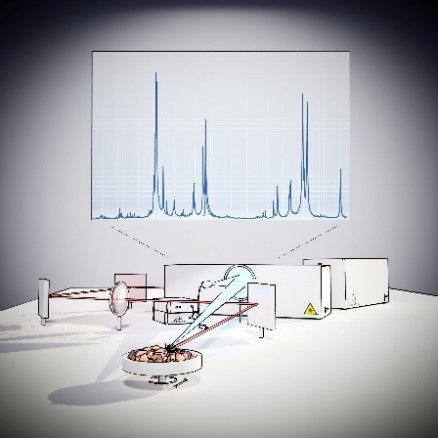
We want to be more! The research institute Swerim conducts needs-based industrial research and development concerning metals and their route from raw material to finished product. Swerim has 200 co-workers in two locations in Sweden - Luleå and Stockholm. Our vision is a fossil-free and circular industry.
Master Thesis: Laser-induced breakdown spectroscopy for chemical analysis of hot materials
1 Place

Schematic of LIBS experimental set up.
We are looking for a master’s student who want to do diploma work in experimental laser spectroscopy. The project goal is to investigate the feasibility of laser-induced breakdown spectroscopy (LIBS) as a rapid tool for quantitative analysis of hot materials. The long-term purpose is to enable online quantitative chemical analysis of molten metals.
Swerim has long experience with development of Laser-Induced Breakdown Spectroscopy (LIBS) as a chemical analysis method in different industrial applications. LIBS uses a high-energy pulsed laser focused on the surface sample and causes a local ablation of the material. This leads to the formation of a plasma onto the sample’s surface that contains excited atoms from the evaporated material. These excited atoms emit light at characteristic wavelengths, giving a “fingerprint” spectrum of the elemental composition of the sample. In previous experiments it has been observed that the LIBS response changes with temperature of the sample, but the underlying cause cannot be clearly understood from the data.
The purpose of the project is to investigate the effect of sample temperature on the LIBS spectra of hot materials (slag, steel). In a first step, this will include LIBS measurements on selected types of slag/steels under well-controlled temperatures (up to approx. 1100 åC). The second step will be to analyze the data using different approaches i.e. classical univariate and multivariate based on machine-learning algorithms. The final goal will be to understand how the response of hot materials correlates with the temperature and eventually propose an approach to correct this temperature dependence in the analysis. The procedure will be adapted to the skills of the student.
Required qualifications
Experience and interest in optical emission spectroscopy is a prerequisite. Experience in data-analysis using Matlab or Pyton is a plus.
Project time
The project is intended for a master thesis (30hp). The start of the work should be initiated during the beginning of 2025 or can be mutually decided through negotiations. The master student performing the work will gain a large industry network.
Further information
This project is intended to be performed at Swerim in Kista (Stockholm). Swerim rewards the student with 50 000 SEK for an approved master thesis (30hp).
Contacts
You are welcome to contact Mélina Gilbert Gatty, melina.gilbert-gatty@swerim.se or Jonas Petersson, jonas.petersson@swerim.se if you have any questions about the project.
Application
Apply by using the application function below. The application can be written in English or Swedish. Latest date for application is December 1 2024. You will receive a confirmation that Swerim has received your application. Please note that we fill the position as soon as we find a suitable applicant, which means we can fill the position before the deadline.
Application
You can no longer apply for this position